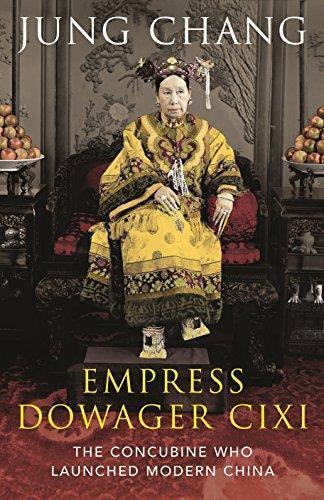464 pages
Langue : English
Publié 15 octobre 2013
The Concubine Who Launched Modern China

464 pages
Langue : English
Publié 15 octobre 2013
Empress Dowager Cixi: The Concubine Who Launched Modern China is a 2013 biography written by Jung Chang, published by Alfred A. Knopf. Chang presents a sympathetic portrait of the Empress Dowager Cixi, who unofficially controlled the Manchu Qing Dynasty in China for 47 years, from 1861 to her death in 1908. Chang argues that Cixi has been "deemed either tyrannical and vicious, or hopelessly incompetent—or both", and that this view is both simplistic and inaccurate. Chang portrays her as intelligent, open-minded, and a proto-feminist limited by a xenophobic and deeply conservative imperial bureaucracy. Although Cixi is often accused of reactionary conservatism (especially for her treatment of the Guangxu Emperor during and after the Hundred Days' Reform), Chang concludes that Cixi "brought medieval China into the modern age."Newspaper reviews were positive in their assessment. Te-Ping Chen, writing in The Wall Street Journal, found the book "packed with details that bring to …
Empress Dowager Cixi: The Concubine Who Launched Modern China is a 2013 biography written by Jung Chang, published by Alfred A. Knopf. Chang presents a sympathetic portrait of the Empress Dowager Cixi, who unofficially controlled the Manchu Qing Dynasty in China for 47 years, from 1861 to her death in 1908. Chang argues that Cixi has been "deemed either tyrannical and vicious, or hopelessly incompetent—or both", and that this view is both simplistic and inaccurate. Chang portrays her as intelligent, open-minded, and a proto-feminist limited by a xenophobic and deeply conservative imperial bureaucracy. Although Cixi is often accused of reactionary conservatism (especially for her treatment of the Guangxu Emperor during and after the Hundred Days' Reform), Chang concludes that Cixi "brought medieval China into the modern age."Newspaper reviews were positive in their assessment. Te-Ping Chen, writing in The Wall Street Journal, found the book "packed with details that bring to life its central character". Specialists, however, were sometimes less favorable, arguing that Chang had not read recent work in the field or made critical use of Chinese language sources. The work has been translated into Chinese, Danish, Dutch, French, Finnish, German, Italian, Japanese, Polish, Portuguese, Russian, and Swedish.